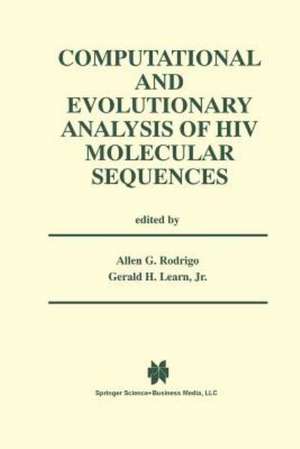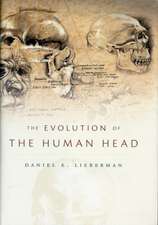Computational and Evolutionary Analysis of HIV Molecular Sequences
Editat de Allen G. Rodrigo, Gerald H. Learn Jr.en Limba Engleză Paperback – 25 apr 2013
| Toate formatele și edițiile | Preț | Express |
|---|---|---|
| Paperback (1) | 1095.16 lei 6-8 săpt. | |
| Springer Us – 25 apr 2013 | 1095.16 lei 6-8 săpt. | |
| Hardback (1) | 1102.31 lei 6-8 săpt. | |
| Springer Us – 30 oct 2000 | 1102.31 lei 6-8 săpt. |
Preț: 1095.16 lei
Preț vechi: 1152.81 lei
-5% Nou
Puncte Express: 1643
Preț estimativ în valută:
209.56€ • 219.35$ • 174.42£
209.56€ • 219.35$ • 174.42£
Carte tipărită la comandă
Livrare economică 31 martie-14 aprilie
Preluare comenzi: 021 569.72.76
Specificații
ISBN-13: 9781475774542
ISBN-10: 1475774540
Pagini: 312
Ilustrații: VIII, 300 p.
Dimensiuni: 155 x 235 x 16 mm
Greutate: 0.44 kg
Ediția:2001
Editura: Springer Us
Colecția Springer
Locul publicării:New York, NY, United States
ISBN-10: 1475774540
Pagini: 312
Ilustrații: VIII, 300 p.
Dimensiuni: 155 x 235 x 16 mm
Greutate: 0.44 kg
Ediția:2001
Editura: Springer Us
Colecția Springer
Locul publicării:New York, NY, United States
Public țintă
ResearchDescriere
Computational and Evolutionary Analysis of HIV Molecular Sequences is for all researchers interested in HIV research, even those who only have a nodding acquaintance with computational biology (or those who are familiar with some, but not all, aspects of the field). HIV research is unusual in that it brings together scientists from a wide range of disciplines: clinicians, pathologists, immunologists, epidemiologists, virologists, computational biologists, structural biologists, evolutionary biologists, statisticians and mathematicians. This book seeks to bridge the gap between these groups, in both subject matter and terminology. Focused largely on HIV genetic variation, Computational and Evolutionary Analysis of HIV Molecular Sequences covers such issues as sampling and processing sequences, population genetics, phylogenetics and drug targets.
Cuprins
Preface. 1. Sampling and Processing HIV Molecular Sequences: a Computational Evolutionary Biologist's Perspective; A.G. Rodrigo, et al. 2. Accessing HIV Molecular Information; B.T. Foley. 3. HIV-1 Subtyping; C.L. Kuiken, T. Leitner. 4. HIV Sequence Signatures and Similarities; B. Korber. 5. Graphical Methods for Exploring Sequence Relationships; G.F. Weiller. 6. Quantifying Heterogeneity in the HIV Genome; H.P. Pinheiro, F. Seillier-Moisewitsch. 7. Phylogenetics of HIV; D. Posada, et al. 8. Goals and Strategies for Analysis of Recombination Among Molecular Sequences; J.C. Stephens. 9. Molecular Population Genetics: Coalescent Methods Based on Summary Statistics; D.A. Vasco, et al. 10. Population Genetics of HIV: Parameter Estimation Using Genealogy-Based Methods; P. Beerli, et al. 11. Detecting Selection in Protein Coding Genes Using the Rate of Nonsynonymous and Synonymous Divergence; R. Neilsen. 12. Drugs Targeted at HIV - Successes and Resistance; C. Sansom, A. Wlodawer. Index.











